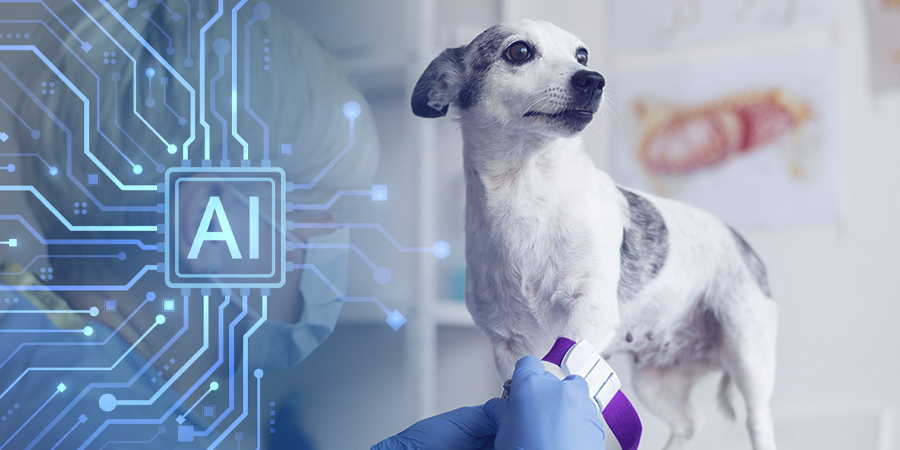The integration of artificial intelligence (AI) into various sectors has catalyzed significant advancements, with the animal industry emerging as a notable beneficiary. From understanding animal behavior to transforming nutrition and health care, AI is proving to be a changer in improving animal welfare.
AI's ability to decode complex data patterns offers profound insights into animal behavior and emotions. Previously, understanding animal well-being has proven to be a challenging endeavor, often relying on observational studies and subjective assessments. AI, however, leverages machine learning (ML) algorithms to analyze vast amounts of data from behavioral studies, providing a more nuanced understanding of animal emotions and stress levels. For example, computer vision systems can monitor changes in animal posture and movement, helping some researchers identify signs of discomfort or distress that may be imperceptible to the human eye. These advancements not only enhance our understanding of animal needs but also contribute to more informed welfare practices.
In the past, the creation of animal diets has been based on a blend of empirical data and experience. AI can optimize feeding strategies by taking into account a variety of factors, including nutritional requirements, growth rates, and health conditions. AI is capable of processing and analyzing large datasets. AI-powered platforms, for example, can design tailored feeding schedules for cattle that maximize growth while reducing waste and expenses. The most suitable nutrition for animals is ensured utilizing this customized approach, which is essential for their general well-being and productivity.
Interesting Read: CatsMe! App Uses AI to Monitor Feline Health Through Facial Recognition
AI and Tech Transform Veterinary Medicine in Thailand
AI's impact on animal health is perhaps one of its most significant contributions. In July, Khon Kaen University’s Faculty of Veterinary Medicine hosted the 25th International Conference (KVAC 2024), marking both a milestone for the university's 60th anniversary and a significant moment in the field of veterinary science. The conference brought together an impressive array of lecturers, researchers, students, and animal health professionals to delve into the latest advancements and innovations in veterinary medicine.
The event, centered around the theme, "Artificial Intelligence and Innovations for Animal Health," emphasized the role of cutting-edge technology in addressing challenges in veterinary medicine. The opening address highlighted the university's commitment to leveraging these advancements to improve animal health.
Key discussions focused on the rapid evolution of AI and technology and their profound effects on veterinary science. Participants explored how these innovations are reshaping learning and development within the field. The event provided a crucial platform for sharing knowledge and discovering new technological solutions.
One notable highlight was the exploration of advanced imaging techniques like MRI and CT scans, which offer detailed views of animal anatomy, aiding in early disease detection and intervention. Additionally, advancements in genetic technologies are enabling targeted breeding programs that enhance health and resilience in animals.
The event also delved into the burgeoning field of regenerative medicine, and discussed the potential of stem cells and tissue engineering to repair damaged tissues and organs, offering new hope for chronic conditions. This reflects a broader trend of integrating technology into veterinary practice, including developments in automated feeding systems and precision agriculture.
Another significant topic was the minimally invasive mitral clamp procedure for treating Mitral Valve Regurgitation (MVR) in dogs. This innovative technique, recently introduced in the region, promises quicker recovery times and reduced costs, demonstrating notable progress in veterinary surgery.
Also Read: Truly Digital: Holograms Give Way to Live Animals In German Circus
SK Telecom Expands AI Veterinary Services Across Southeast Asia
SK Telecom, a global leader in telecommunications, has expanded its artificial intelligence-based veterinary care service, X Caliber, to Southeast Asia. The service, initially launched in Korea, assists with veterinary X-ray image diagnosis.
As part of a recent agreement signed in Kuala Lumpur, Malaysia, SK Telecom has partnered with local companies to introduce X Caliber in Malaysia, Thailand, and Vietnam. This service, which has already been launched in Thailand and Vietnam, will be available in Malaysia by the third quarter of 2024. SK Telecom also rolled out X Caliber in Australia and North America earlier this year.
The integration of X Caliber into the Southeast Asian market highlights the growing global emphasis on AI-driven veterinary diagnostics. This development underscores Asia’s ongoing commitment to enhancing animal health through innovative technologies.
AI's integration into the animal industry represents a significant leap forward in improving animal welfare. By enhancing our understanding of animal behavior, optimizing nutrition, advancing health care, and improving living conditions, AI is setting new standards for animal care and management. As technology continues to advance, its role in fostering a more compassionate and informed approach to animal welfare will undoubtedly grow.
Embracing these innovations not only benefits the animals but also supports sustainable agricultural practices and advances veterinary science, paving the way for a future where technology and compassion work hand in hand to improve the lives of all sentient beings.
Continue Reading: The Role of Artificial Intelligence in Driving Digital Economies in Asia






